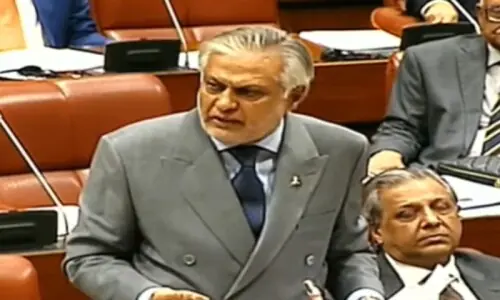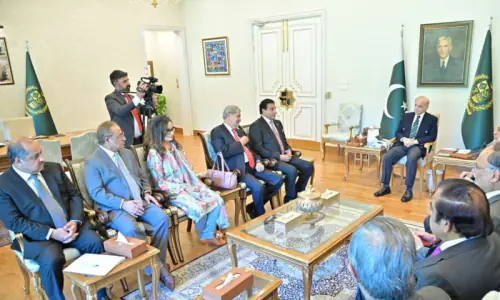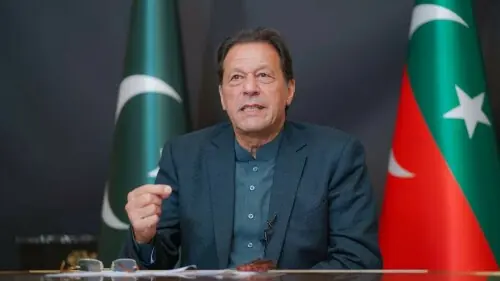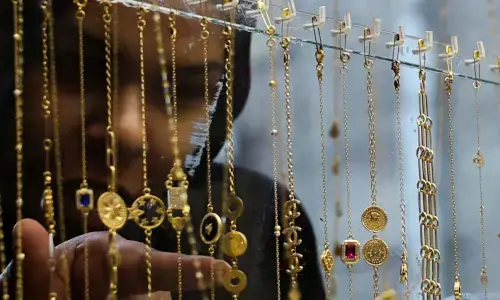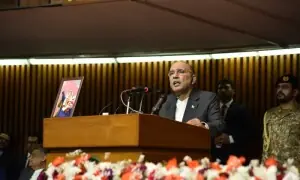The high treason case against former military ruler Pervez Musharraf took a new turn on Monday as the interior ministry filed a petition in the Islamabad High Court (IHC), requesting it to set aside a special court's decision to reserve its judgement in the case.
The special court had on November 19 concluded the trial proceedings in the high treason case against Musharraf for declaring a state of emergency on November 3, 2007, and had ruled that a verdict would be announced on November 28 (Thursday) on the basis of the available record.
In the petition filed through its secretary today, the interior ministry has stated that the special court's decision to reserve its verdict in the case is in violation of the Constitution because it was issued without giving the ministry the opportunity to notify a new prosecution team in the case and because the judgement is set to be passed without hearing the prosecution during the trial.
On October 24, the special court was informed that the government had sacked the entire prosecution team engaged by the previous PML-N government to prosecute the high treason case against Musharraf.
The special court had later on Nov 19 reserved its verdict, observing that the prosecution team before being sacked had submitted detailed arguments which were sufficient to understand their point of view.
The ministry has stated that if the special court proceeds to pass its judgement without hearing the prosecution, "the accused (Musharraf) will be handed an opportunity to escape punishment for purely technical legal faults".
It argues that the federal government has the mandate to change the prosecution team and cites a "defective application of procedure, lengthy delay and expense incurred at [the] trial" as reasons for denotifying the prosecution team in Musharraf's case.
According to the petition, the initial prosecution team after being denotified on October 23, 2019, had no authority to file written arguments on behalf of the federal government, nor to represent it at the hearing on Oct 24. Therefore, any verdict issued on the basis of these written arguments filed unlawfully "cannot be deemed to be a judgement [passed] after hearing the prosecution", it states.
The ministry has requested the IHC to set aside the special court's Nov 19 order to reserve its judgement in the treason case. It adds that in the interim, the operation of the order be suspended, and the interior ministry be given the opportunity to renotify a prosecution team for the case.
The petition has asked the IHC to restrain the special court from issuing its final judgement in the case until the requirements of Section 6 of the Criminal Law Amendment (Special Court) Act, 1976, have been complied with.
Musharraf's lawyer petitions IHC
Also on Monday, a lawyer for Musharraf, Barrister Salman Safdar, petitioned the IHC seeking the suspension of the special court's order to reserve its judgement in the case.
Safdar has requested the high court to restrain the special court from passing its final verdict till Musharraf is granted "his right of audience in a case involving capital punishment".
After Musharraf's former lawyer, incumbent law minister Dr Farogh Nasim, had assumed the portfolio of law ministry, Barrister Safdar had appeared on behalf of the former military ruler, but he was barred from arguing the treason case as the special court noted that a ‘fugitive’ could not be represented through an attorney unless he surrendered before the court.
In his petition, Barrister Safdar has urged the IHC to declare his removal in the case "illegal and unconstitutional" and order his reinstatement.
The lawyer "has been deprived of his right to represent [Musharraf] without any recorded reason or allegation of mistake or improper conduct", the petition states, adding that the court's order for his removal is in violation of Articles 4 and 10-A of the Constitution.
A three-member larger bench headed by IHC Chief Justice Athar Minallah will take up both the interior ministry and Musharraf's lawyer's petitions on Tuesday (tomorrow). The other members of the bench will be Justice Aamer Farooq and Justice Mohsin Akhtar Kayani.
LHC takes up Musharraf's petition
The development comes hours after the Lahore High Court (LHC) took up former president Musharraf's petition challenging the verdict reserved by the special court in the high treason case against him.
Justice Syed Mazhar Ali Akbar Naqvi, who presided over the proceedings, asked Musharraf's lawyer, Khwaja Ahmed Tariq Rahim, to present two-point statements tomorrow and assist the court regarding the maintainability of the petition.
He was instructed to present his arguments on the following points:
- How can the LHC hear the petition if there are proceedings against Musharraf ongoing in the Supreme Court?
- Musharraf is a resident of Islamabad — how is the petition maintainable in Lahore?
On Saturday, Musharraf had approached the LHC against the verdict reserved in the high treason case and sought suspension of his trial in absentia.
Musharraf's counsel had approached the high court on his client's behalf contending that the reserving of the verdict was "unconstitutional and void". It was pleaded that the impugned order from that date be suspended and that "the trial in absentia being conducted against the petitioner" be stayed until his physical appearance before the court.
Referring to a 2016 judgement "Mustafa Impex" by the Supreme Court, the petition argued that the rights of the petitioner be enforced and the trial be "re-initiated" on the basis of the proper procedure contained in the judgement.
During today's hearing, Justice Naqvi asked Rahim how the petition was maintainable in the LHC.
Citing the example of cases against former prime minister Nawaz Sharif, Rahim said that Nawaz's cases were also ongoing in Islamabad but the LHC had found his petition maintainable. He added that it was a matter pertaining to the federal government, therefore, they could appeal to any high court.
According to Rahim, at the time the treason case against Musharraf was initiated, the approval of then-premier Nawaz had been taken. However, the approval of the cabinet was not sought.
Adjourning proceedings till Tuesday, Justice Naqvi asked the former president's lawyer to assist them in understanding how the petition could be heard in the LHC.
The high treason trial of the former military dictator for clamping the state of emergency has been pending since December 2013.
He was booked in the treason case in December 2013. He was indicted on March 31, 2014, and the prosecution had tabled the entire evidence before the special court in September the same year. However, due to litigation at appellate forums, the trial of the former president lingered on and he left Pakistan in March 2016.












